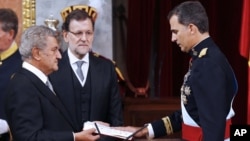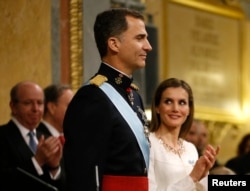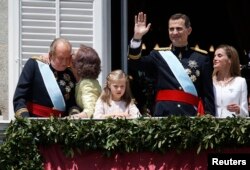Spain's new King Felipe VI swore to serve the crisis-stricken nation as he launched his reign on Thursday.
The ceremony, at Spain's lower house of parliament, had little pomp and circumstance compared with royal handovers in other countries. It was more of a legal process, attended by lawmakers, high-level politicians and some members of the royal family. No foreign leaders were invited.
The event had been designed to chime with times of austerity, palace officials say, mindful that more than one in four Spanish workers is jobless despite an incipient economic recovery.
Felipe's father, Juan Carlos, did not attend the event to allow the spotlight to rest fully on the new monarch, according to the palace.
Swearing his oath in parliament in a dark blue military uniform, Felipe, 46, promised "a renewed monarchy for new times," after scandals that tainted the reign of Juan Carlos.
Spanish unity
A large portion of Felipe's speech was dedicated to the issue of national unity. "There is room for all of us in a united and diverse Spain," he said.
He stressed respect for the diverse cultures and languages within Spain, a clear message to people in Catalonia and Basque Country who want to break away from Spain.
The multilingual gesture, however, got a cool response from the regional leaders of Catalonia and Basque Country, who were sitting in the Parliament listening to the speech and were notably restrained in their applause.
Applause and cries of "Long live the King!" filled the chamber as Felipe finished his speech and turned to kiss his wife, Letizia.
Felipe became king after his father, Juan Carlos, abdicated earlier this month following a series of scandals that led many Spaniards - especially younger generations - to question the role of the monarchy itself.
One of the biggest challenges for Felipe will be whether he can use his symbolic role to spur dialogue between the leaders of Spain and the wealthy northeastern region of Catalonia, where there is a growing independence movement.
Driven to palace
After the ceremony the king rode in an open Rolls Royce through central Madrid with his wife, Queen Letizia, a former journalist, and an escort of mounted guards with tasseled helmets in a route decorated by red and yellow flowers, the color of Spain's flag.
Thousands of Spaniards put aside their World Cup misery to line the sun-splashed streets, yelling "Long live the king!" as the open-topped, black Rolls Royce with the new king and queen drove by.
Security was very tight in central Madrid, with helicopters buzzing overhead, and police had carried out house-to-house searches along the route Felipe was being driven, with 7,000 police and 120 snipers out on the streets.
Felipe and Letizia appeared on the balcony of the Royal Palace with their blonde, blue-eyed daughters: Leonor, 8, who is now heiress to the throne, and Sofia, 7, and waved to cheering crowds below.
The outgoing king and his wife, Queen Sofia, will also stay away from an afternoon reception at the Royal Palace with 2,000 guests from all walks of society.
The celebrations offered a distraction from the national gloom of Spain's humiliating exit from the football World Cup on Wednesday in a 2-0 beating by Chile.
"We have lost the World Cup but that doesn't matter. It is a new day and a new king. We have to celebrate," said Eduardo Chaperon, a 24-year-old economist waving a Spanish flag and wearing a novelty inflatable crown in the street.
Protests barred
Not everyone joined in the party though.
Protests by campaigners who want Spain to be a republic broke out after Juan Carlos announced his abdication on June 2. Police banned a similar protest called by activists for Thursday.
On Wednesday, a teary-eyed and infirm Juan Carlos, 76, ended his reign with a stroke of a golden pen as he signed his act of abdication in the tapestry-clad Hall of Columns in the Royal Palace.
Juan Carlos, who walks with a cane after repeated hip operations, hugged Felipe and briefly gripped his son's arm to steady himself in his final act as monarch.
The former king earned broad respect for guiding Spain to democracy after the death of General Francisco Franco in 1975 and for thwarting an attempted military coup in 1981.
However, the monarchy was rocked when Juan Carlos went on a luxurious elephant-hunting safari in Botswana as Spaniards endured financial hardship, and his youngest daughter, Princess Cristina, was obliged to testify in a fraud and money-laundering case engulfing her husband, Olympic handball medalist turned businessman Inaki Urdangarin.
In his speech to parliament, Felipe acknowledged a need to restore the monarchy's image after recent royal scandals.
Some information for this report provided by Reuters, AFP and AP.
The ceremony, at Spain's lower house of parliament, had little pomp and circumstance compared with royal handovers in other countries. It was more of a legal process, attended by lawmakers, high-level politicians and some members of the royal family. No foreign leaders were invited.
The event had been designed to chime with times of austerity, palace officials say, mindful that more than one in four Spanish workers is jobless despite an incipient economic recovery.
Felipe's father, Juan Carlos, did not attend the event to allow the spotlight to rest fully on the new monarch, according to the palace.
Swearing his oath in parliament in a dark blue military uniform, Felipe, 46, promised "a renewed monarchy for new times," after scandals that tainted the reign of Juan Carlos.
Spanish unity
A large portion of Felipe's speech was dedicated to the issue of national unity. "There is room for all of us in a united and diverse Spain," he said.
He stressed respect for the diverse cultures and languages within Spain, a clear message to people in Catalonia and Basque Country who want to break away from Spain.
The multilingual gesture, however, got a cool response from the regional leaders of Catalonia and Basque Country, who were sitting in the Parliament listening to the speech and were notably restrained in their applause.
Applause and cries of "Long live the King!" filled the chamber as Felipe finished his speech and turned to kiss his wife, Letizia.
Felipe became king after his father, Juan Carlos, abdicated earlier this month following a series of scandals that led many Spaniards - especially younger generations - to question the role of the monarchy itself.
One of the biggest challenges for Felipe will be whether he can use his symbolic role to spur dialogue between the leaders of Spain and the wealthy northeastern region of Catalonia, where there is a growing independence movement.
Driven to palace
After the ceremony the king rode in an open Rolls Royce through central Madrid with his wife, Queen Letizia, a former journalist, and an escort of mounted guards with tasseled helmets in a route decorated by red and yellow flowers, the color of Spain's flag.
Thousands of Spaniards put aside their World Cup misery to line the sun-splashed streets, yelling "Long live the king!" as the open-topped, black Rolls Royce with the new king and queen drove by.
Security was very tight in central Madrid, with helicopters buzzing overhead, and police had carried out house-to-house searches along the route Felipe was being driven, with 7,000 police and 120 snipers out on the streets.
Felipe and Letizia appeared on the balcony of the Royal Palace with their blonde, blue-eyed daughters: Leonor, 8, who is now heiress to the throne, and Sofia, 7, and waved to cheering crowds below.
The outgoing king and his wife, Queen Sofia, will also stay away from an afternoon reception at the Royal Palace with 2,000 guests from all walks of society.
The celebrations offered a distraction from the national gloom of Spain's humiliating exit from the football World Cup on Wednesday in a 2-0 beating by Chile.
"We have lost the World Cup but that doesn't matter. It is a new day and a new king. We have to celebrate," said Eduardo Chaperon, a 24-year-old economist waving a Spanish flag and wearing a novelty inflatable crown in the street.
Protests barred
Not everyone joined in the party though.
Protests by campaigners who want Spain to be a republic broke out after Juan Carlos announced his abdication on June 2. Police banned a similar protest called by activists for Thursday.
On Wednesday, a teary-eyed and infirm Juan Carlos, 76, ended his reign with a stroke of a golden pen as he signed his act of abdication in the tapestry-clad Hall of Columns in the Royal Palace.
Juan Carlos, who walks with a cane after repeated hip operations, hugged Felipe and briefly gripped his son's arm to steady himself in his final act as monarch.
The former king earned broad respect for guiding Spain to democracy after the death of General Francisco Franco in 1975 and for thwarting an attempted military coup in 1981.
However, the monarchy was rocked when Juan Carlos went on a luxurious elephant-hunting safari in Botswana as Spaniards endured financial hardship, and his youngest daughter, Princess Cristina, was obliged to testify in a fraud and money-laundering case engulfing her husband, Olympic handball medalist turned businessman Inaki Urdangarin.
In his speech to parliament, Felipe acknowledged a need to restore the monarchy's image after recent royal scandals.
Some information for this report provided by Reuters, AFP and AP.







